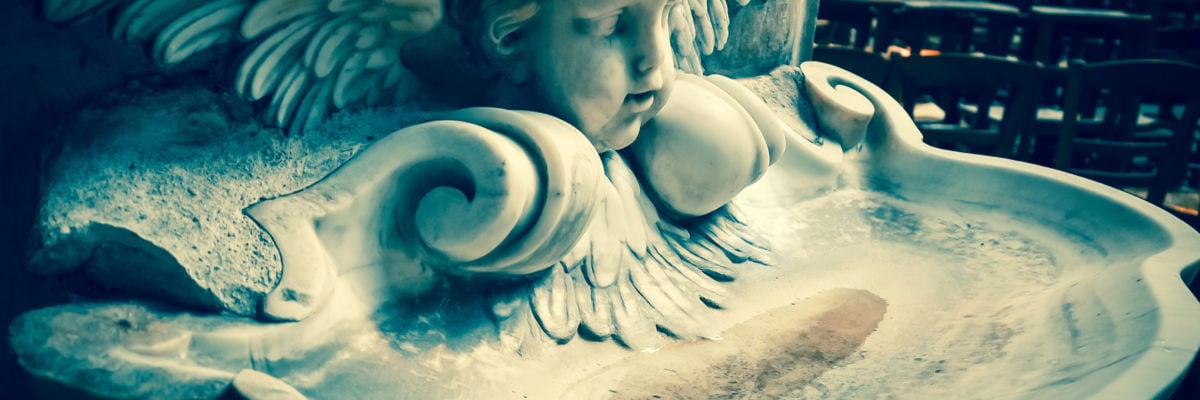
Holy water is a sacramental. It is water blessed by a priest to impart God’s blessing on those who use it. There are varying kinds of this blessed water, the principal ones of which are ordinary, used in common sprinkling and in the wall fonts of churches and homes; baptismal water, which contains oil of catechumens and chrism oil and is used only in the sacrament of baptism; and consecration water, sometimes referred to as “Gregorian water,” with ashes, salt, and wine, used in the consecration of churches.
The sacramental of holy water is used in baptism, in exorcisms, in the intermingling with palm ashes, at certain Masses throughout the liturgical year, at each Compline prayer in certain liturgical rites, and in funerals. It is also sprinkled on the sick. From this list, which omits several other common uses of holy water (it is used to bless just about anything), we can see that this sacramental is an integral part of Catholic life.
The charge persists that holy water is not found in Sacred Scripture and is an invention of the Church. This is not the case, as there are a handful of biblical references to blessed water and its effects.
The first is actually in the beginning of the Bible: “The Spirit of God was moving over the face of the waters” (Gen. 1:2). Emerging from the void, God’s first act was to move across the waters of the earth he was prepared to form, first being sure to bless the waters for the goodness of his creation and the coming forth of all other matter. The Catechism acknowledges this: “Since the beginning of the world, water, so humble and wonderful a creature, has been the source of life and fruitfulness” (1218).
We even have a recipe for holy water in the Old Testament, not distant from that found in today’s rituals: “The priest shall take holy water in an earthen vessel, and take some of the dust that is on the floor of the tabernacle and put it into the water” (Num. 5:17). Later in this same book, we find instructions pertaining to one defiled by touching a corpse: “He who touches the dead body of any person shall be unclean seven days; he shall cleanse himself with the water on the third day and on the seventh day, and so be clean” (19:11-12).
The ancient Jews, then, truly knew the importance of blessed water. After the sacrament of baptism is revealed to the apostles, we see holy water become an important sacramental of the Catholic Church. The Church encourages us to use holy water because it can yield many graces and blessings in our lives:
- It helps us to overcome temptations. The rite of providing holy water in the Roman Ritual includes an exorcism prayer: “May all evil fancies of the foul fiend, his malice and cunning, be driven afar from the place where you are sprinkled. And let every unclean spirit be repulsed by him who is coming to judge both the living and the dead and the world by fire.”
- It drives away sickness and future illnesses. Holy water can help keep away illnesses of the body, mind, and soul. One of the prayers of blessing a priest says asks that the water become “a medicine for body and soul for all who make use of” it.
- It removes venial sins. St. Thomas Aquinas wrote, “By the sprinkling of holy water the debt of venial sin is wiped out; but not always, however, are all temporal punishments relinquished.”
- It drives away the devil. St. Teresa of Avila once said, “I often experience that there is nothing the devils flee from more, without returning, than holy water.”
Any Catholic may use holy water to gain these corporeal and spiritual benefits. A clean and suitable container may be brought to a Catholic parish, where holy water is almost always available in a large container, typically near the sacristy or confessionals. Catholic stores also sell a variety of vials, and it is a beautiful tradition among pious Catholics to have holy water fonts in the entrance to their homes and in common rooms. God chooses the simple things of the world for his purposes (1 Cor. 1:27), and holy water is his unique gift to fight the spiritually unclean with the spiritually clean.
This article is adapted from our booklet 20 Answers: Relics & Sacramentals by Shaun McAfee, available at the Catholic Answers shop.



